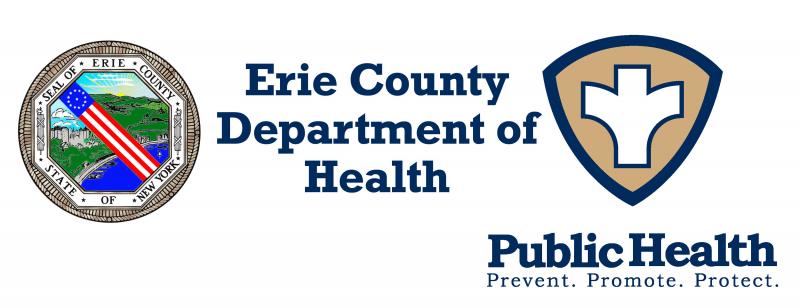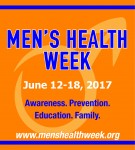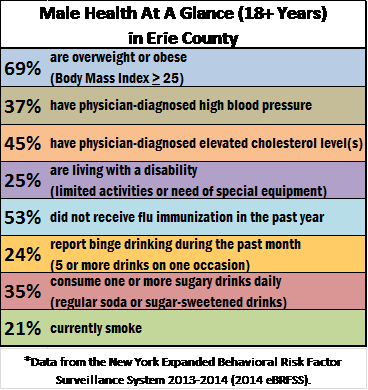Modified: June 13, 2017 6:06pm
Latest News

PRESS RELEASE
From the Office of the Commissioner of Health, Dr. Gale R. Burstein
Date: June 13, 2017
CONTACT: Mary C. St. Mary/Mary.StMary@Erie.Gov
Phone: 716.858.4941/ Mobile: 716.253.3925
National Men’s Health Week
Encouraging Men to Make Their Health a Priority
ERIE COUNTY, NY— National Men’s Health Week is observed each year leading up to Father’s Day. This week, June 12-18, 2017, is a reminder for men to take steps to be healthier, but they do not have to do it alone! Whether it is your husband, partner, dad, brother, son, or friend you can help support the health and safety of the men in your life and encourage them to make their health a priority. 
“Most men need to pay more attention to their health,” said Dr. Gale Burstein, Erie County Commissioner of Health. “Compared to women, men are more likely to: smoke, drink alcohol, make unhealthy or risky choices, and put off regular checkups and medical care.”
Men can take charge of their health by having regular checkups with their healthcare providers, even if they feel fine. A yearly physical should include discussions of your health habits and family history, setting health goals and getting any necessary screenings or exams. This is important because some diseases do not initially produce symptoms. In addition, men should:
- Get appropriate preventive screening teststo find problems early, when they may be easier to treat.
- Get your blood pressure checked at least once every 2 years
- Talk to your doctor about getting your cholesterol checked, as you may have undiagnosed high cholesterol
- If you are age 50 to 74, get tested regularly for colorectal cancer. Ask your doctor what type of colorectal cancer screening test is right for you
- If you are a man age 65 to 75 and have ever smoked, talk with your doctor about your risk for abdominal aortic aneurysm (AAA)
- Ask your doctor to screen you for depression.
- Ask your doctor about taking aspirin every day. If you are age 50 to 59, taking aspirin every day can lower your risk of heart attack and colorectal cancer.
- Make sure you are up to date on important vaccinations
- Do Not Smoke! If you smoke or use other tobacco products, ask your healthcare provider to help you quit. Avoid exposure to secondhand smoke, air pollution and chemicals, such as those in the workplace.
- Maintain a healthy weight. Losing excess pounds — and keeping them off — can lower your risk of heart disease as well as various types of cancer.

- Limit alcohol.
- If you choose to drink alcohol, do so in moderation--up to two drinks a day for men age 65 and younger, and one drink a day for men older than age 65. The risk of various types of cancer, such as liver cancer, appears to increase with the amount of alcohol you drink and the length of time you have been drinking regularly. Too much alcohol can also raise your blood pressure.
- Get active.
- Exercise can help you control your weight, lower your risk of heart disease and stroke and possibly lower your risk of certain types of cancer. Choose activities you enjoy, such as tennis, basketball or brisk walking. All physical activity benefits your health.
- Eat healthy.
- It does not have to be complicated. A healthy diet consists mainly of fruits and vegetables, whole grains and lean meats, while limiting foods high in saturated fat and sodium. Most of us know what is good for us, but we are not always good at choosing the healthy options.
- Get Good Sleep
- Adults need between 7-9 hours of sleep. Insufficient sleep is associated with a number of chronic diseases and conditions, such as diabetes, cardiovascular disease, obesity, and depression. Poor sleep is also responsible for motor vehicle and machinery-related accidents.
- Avoid unhealthy behaviors, such as smoking, texting while driving, and not wearing a seatbelt or bicycle helmet.
- Find out what additional steps you can take based on your age
- Motor vehicle accidentsare another common cause of death among men. Stay safe on the road:
- Wear your seat belt
- Follow the speed limit
- Do not drive under the influence of alcohol or any other substances
- Do not drive while sleepy
- Suicide is another leading men's health risk. If you have signs and symptoms of depression—an important risk factor — talk to your healthcare provider. Treatment is available. If you have any thoughts about suicide, call 911 or go the nearest emergency room.
“On average, men die almost 6 years younger than women and suffer higher mortality rates for the top causes of death,” added Burstein. “We need to encourage the men in our families to become more proactive in taking care of their health, to seek preventive screenings where appropriate and to become an active advocate for their own wellbeing.”
# # #
For More Information:
U.S. National Library of Medicine: MedlinePlus—Men’s Health
Healthfinder.gov—Men: Take Charge of Your Health
Centers for Disease Control and Prevention (“CDC”): Men’s Health Statistics
CDC--Cheat Sheet for Men’s Cancer Screenings and Good Health

